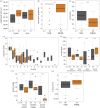Linking cognition to ecology in wild sympatric mouse lemur species
- PMID: 34814746
- PMCID: PMC8611352
- DOI: 10.1098/rspb.2021.1728
Linking cognition to ecology in wild sympatric mouse lemur species
Abstract
Cognitive abilities covary with both social and ecological factors across animal taxa. Ecological generalists have been attributed with enhanced cognitive abilities, but which specific ecological factors may have shaped the evolution of which specific cognitive abilities remains poorly known. To explore these links, we applied a cognitive test battery (two personality, ten cognitive tests; n = 1104 tests) to wild individuals of two sympatric mouse lemur species (n = 120 Microcebus murinus, n = 34 M. berthae) varying in ecological adaptations but sharing key features of their social systems. The habitat and dietary generalist grey mouse lemurs were more innovative and exhibited better spatial learning abilities; a cognitive advantage in responding adaptively to dynamic environmental conditions. The more specialized Madame Berthe's mouse lemurs were faster in learning associative reward contingencies, providing relative advantages in stable environmental conditions. Hence, our study revealed key cognitive correlates of ecological adaptations and indicates potential cognitive constraints of specialists that may help explain why they face a greater extinction risk in the context of current environmental changes.
Keywords: cognition; ecology; evolution; habitat; learning; primates.
Figures


References
-
- Humphrey N. The social function of intellect. In Growing points in ethology (eds Bateson PPG, Hinde RA), pp. 303-317. Cambridge, UK: Cambridge University Press.
-
- Parker ST, Gibson KR. 1977. Object manipulation, tool use and sensorimotor intelligence as feeding adaptations in cebus monkeys and great apes. J. Hum. Evol. 6, 623-641. ( 10.1016/S0047-2484(77)80135-8) - DOI
-
- Henke-von der Malsburg J, Kappeler PM, Fichtel C. 2020. Linking ecology and cognition: does ecological specialisation predict cognitive test performance? Behav. Ecol. Sociobiol. 74, 154. ( 10.1007/s00265-020-02923-z) - DOI
Publication types
MeSH terms
Associated data
LinkOut - more resources
Full Text Sources
